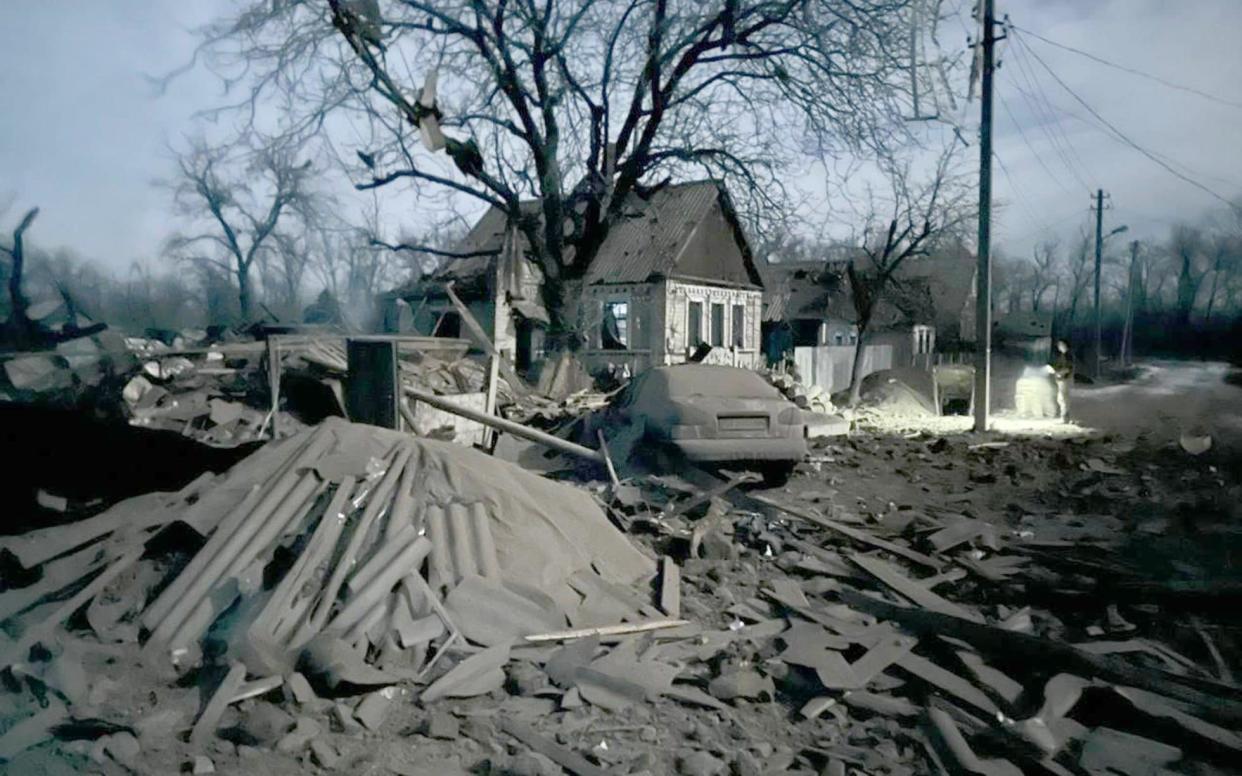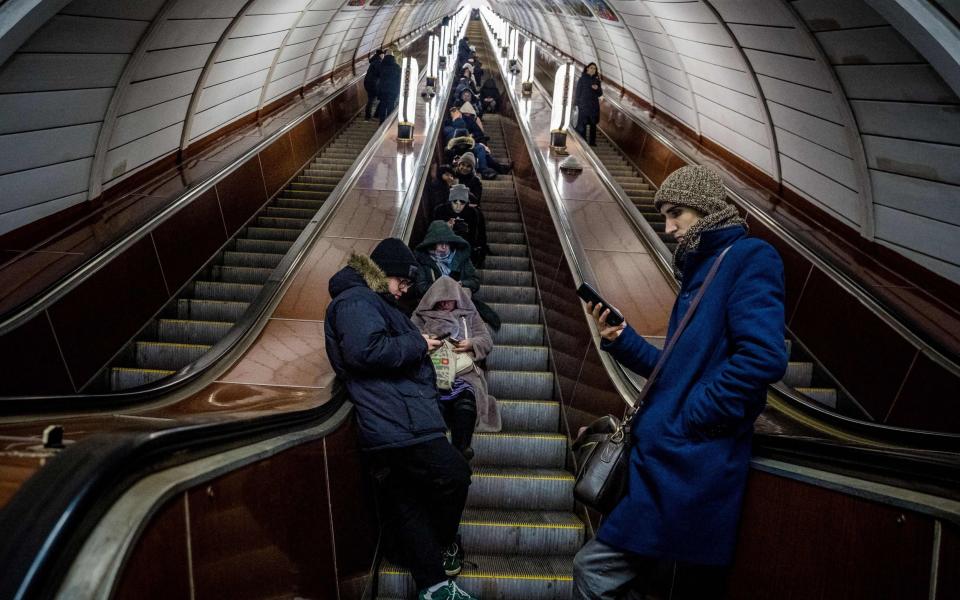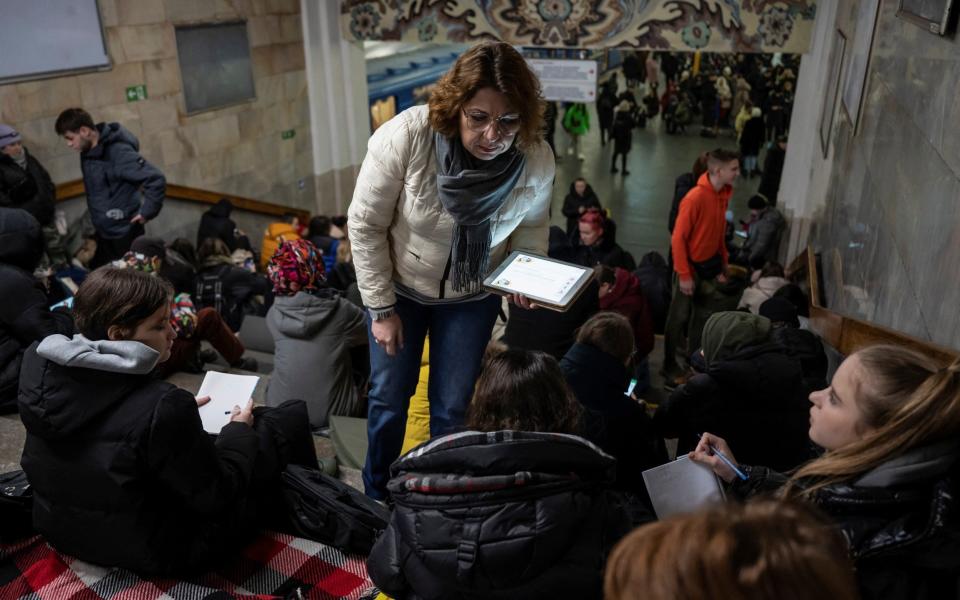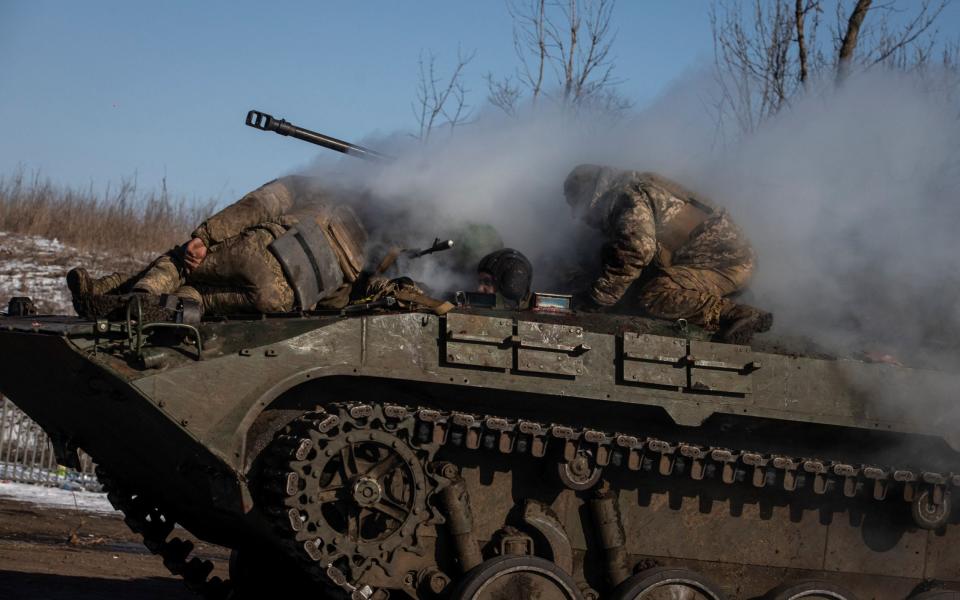Putin launches major Ukraine offensive with hail of missiles

Listen to a panel of the Telegraph's experts analyse Russia's latest attack on our daily podcast, "Ukraine: The Latest".
Russia has launched its heaviest bombardment on southern Ukraine since the start of the war, as officials warned Moscow's major offensive had "definitely" started.
Ukraine’s Air Force said Russian forces had fired missiles from TU-95 strategic bombers and Iranian-built kamikaze drones at multiple targets across the country.
Moscow also launched 35 S-300 missiles, usually used for air defence, at ground targets, Yuriy Ignat, Ukraine’s Air Force spokesman, added.
The missile attack on Ukraine was the 14th mass strike, which since October have mainly been focused on the country’s energy network.
The latest strikes came after Volodymyr Zelensky, Ukraine's president, returned from a mini-European tour of London, Paris and Brussels, where he urged allies to deliver long-range missiles and fighter jets to bolster his military's defences.
“Arms for Ukraine – the best way to stop Russian arrogance,” Andriy Yermak, his chief of staff, said after the attacks.
Mykhailo Podolyak, a presidential adviser, wrote on social media that Russia's “intention is the same: mass destruction and killing. Enough talk and political hesitation."
More than 70 missiles and Iranian-built kamikaze drones were fired at multiple targets across the country, Ukraine’s Air Force said.
A group of young students were spotted huddled around their teacher in a Kyiv metro station as the capital’s terrified residents went underground to wait out the bombardment.

The strikes coincided with the launch of a major Russian offensive that Kyiv predicted would take place before the first anniversary of the full-scale invasion, Ukrainians officials said.
Intelligence officers in Kyiv have published details of what they believe to be an attempt by Russia to capture the remaining unoccupied parts of the Donbas, as well as target Zaporizhzhia in the south.
Pavlo Krylenk, governor of Donetsk, said the offensive had "definitely" started.
Serhii Haidai, Luhansk's governor, told Ukrainian Radio NV: "Over the past week to 10 days, the frequency of shelling has increased. The daily number of attacks has increased. In real terms, this is part of the full-scale offensive planned by the Russians."
Russia is thought to be scoring incremental gains on the battlefield as it closes in on the key city of Bakhmut.
However, their forces likely lost dozens of armoured vehicles during a failed attack on the eastern Ukrainian city of Vuhledar, British intelligence said on Friday.
Vuhledar, a Ukrainian-held bastion at the strategic intersection between the eastern and southern front lines, has seen some of the bloodiest fighting of the war as Russia continues a relentless assault on the eastern front.
"Russian troops likely fled and abandoned at least 30 mostly intact armoured vehicles in a single incident after a failed assault," Britain's defence ministry said in a daily briefing.

It was not possible to immediately verify the report.
Russia's defence ministry has not commented on the report but it says military operations near Vuhledar and the city of Bakhmut in eastern Ukraine - which Russia has been trying to encircle - are progressing well.
Its forces have been making clear, if gradual, advances in the area in the past month, notably capturing the salt-mining town of Soledar to Bakhmut's north.
Russian military bloggers, often highly critical of the performance of the country's military top brass in Ukraine, have also spoken of the reported losses in Vuhledar.
One said on Thursday that 31 armoured vehicles had been destroyed by Ukrainian drones after being sent in without the cover of artillery, reposting pictures from a Ukrainian Telegram channel that shares photos from the combat zone.
"Thirty-one armoured vehicles of the 155th Separate Guards Marine Brigade from the Russian Pacific Fleet were destroyed during an assault on Vuhledar," the Moscow Calling military blogger said.
Grey Zone, the semi-official Telegram channel of the Wagner mercenary group, said in a post that "a disaster is unfolding around Vuhledar, and it is unfolding again and again".
As the anniversary of Russia's invasion approaches on Feb 24, Kyiv says Moscow has sacrificed wave upon wave of soldiers and mercenaries in a pointless assault to notch up territorial gains in the region.

As Russia launched its missile attacks on Friday explosions rang out in Kyiv as an air raid alert was declared throughout the war-torn country.
Valeriy Zaluzhnyi, Ukraine's commander in chief, said two Russian Kalibr cruise missiles launched from the Black Sea crossed Moldovan and Romanian airspace before flying back into Ukraine.
He claimed Ukraine’s air defence systems could have downed the Russian weapons but opted not to in order not to risk hitting residents in the neighbouring countries.
As air raid alerts went off four times in Kyiv on Friday some rushed to shelter but many others seemed apathetic about yet another wave of missiles.
When the first siren went off around the capital at around 4am on Friday, only about a dozen people sought shelter in the bomb-proof station under Maidan Nezalezhnosti, the city’s central square.

There is a sense of grim, unflappable determination in the city. Many say they only run to a shelter if they hear a blast somewhere in the city.
Later, when sirens rang out at 8.30am, 1pm, and 4.30pm, many people carried on strolling through the city’s streets, puffing on cigarettes in the crisp sunshine.
Kyiv is well defended by anti-missile systems and the Vitaliy Klitschko, the city's mayor, said that Ukrainian air defences shot down 10 missiles on Friday.

Debris from these rockets fell in the southern Holosiiv district, reportedly damaging a house and two cars. “There is damage to electrical networks. There are no casualties. Energy workers are working to restore networks," Mr Klitschko said
“Air defence working massively in Kyiv,” Lesia Vasylenko, a Ukrainian MP wrote on Twitter, “Apart from that the city is extra quiet, as if before a storm.”
Two cars, a house and power grids were damaged by the debris of one rocket in the Holosiivskyi district of Kyiv.
The southern city of Zaporizhzhia came under its heaviest bombardment since the start of the war almost a year ago, Anatolii Kurtiev, secretary of the city council, said.
He claimed the city had been struck 17 times in one hour during the aerial bombardment.
Maksym Marchenko, regional governor of the southern region of Odesa, said: “Enemy aviation is in the air and ships which can carry Kalibr missiles are in the sea. The enemy launched the missiles. The air alert will be long.”

 Yahoo News
Yahoo News 
